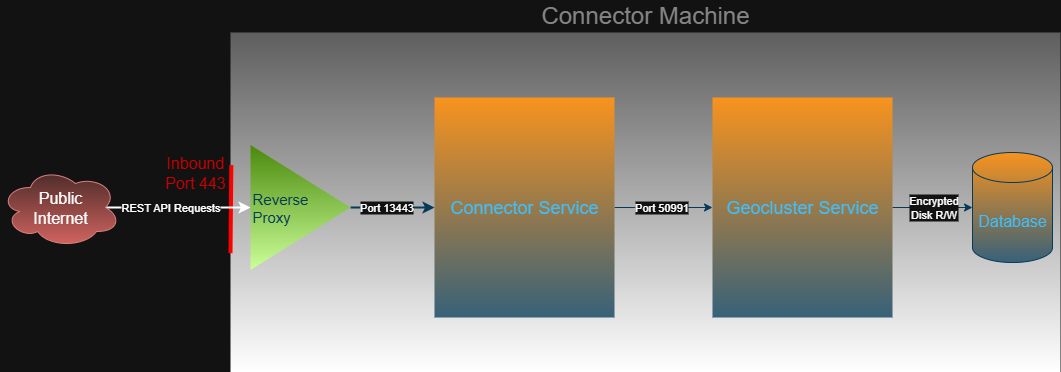Connector Components
The Xiid Connector is made up of two components, which also operate as separate services on the machine.

Connector Service
TIP
The port bindings for the Connector and Geonode Services can be configured during initial installation or any time after through the h2connector.json file (Connector Service) and geonode.json file (Geonode Service).
The Connector Service handles all HTTPS REST API requests for the Connector Portal and the other Xiid software communications, such as between STLinks.
Ports and Purpose
The Connector Service binds to port 13443 by default but can be configured to bind to port 443.
Xiid recommends binding the Connector Service to port 13443 and using a reverse-proxy solution, such as NGINX to bind to port 443 and forward the HTTP2.0 (H2) connections to the Connector Service. This provides an additional layer of security over the Connector Service, as exploits that may affect the reverse proxy may be blocked by the Connector Service, and vice versa.
Once the Connector Service is running, it listens for REST API requests that come in from the Connector Portal, the Commander Service, and the STLink Service. The Connector Service also communicates with other Connector Services via REST APIs to propagate updates across the Geocluster.
The majority of interactions with the Connector Service will occur through the Connector Portal. Connector Service configurations are available through the web portal in a streamlined user experience.
For Software-as-a-Service installations of the SealedTunnel, the Connector Service will be managed by Xiid. For self-hosted Connectors, system administrators will generally interact with the Connector Service through the Connector Portal, however, Swagger API documents are available for system adminstrators that would like to leverage the Connector's APIs.
Geonode Service
The Geonode Service is the engine of Xiid's masterless database. Each Geonode operates as a peer in a massively distributed cluster, managing its own local database and seamlessly propagating updates across the network.
Built in-house to handle highly scalable data, the Geonode Service ensures robust performance without a single point of failure. The entire Geocluster is configured at installation, requiring no ongoing management or user interface.
Ports and Purpose
The Geonode Service runs by default on port 50991 and predominantly communicates with the Connector Service and other Geonode Services, either through private IP addresses, if all Connectors are in the same subnetwork, or through the Public IP address for Connector communication across separate networks.
If you have multiple clusters deployed across separate networks, you will need to open port 50991 to the Geonode Services available on each Connector in the cluster.
Logs
For information on the Connector log locations, please see the log section.

